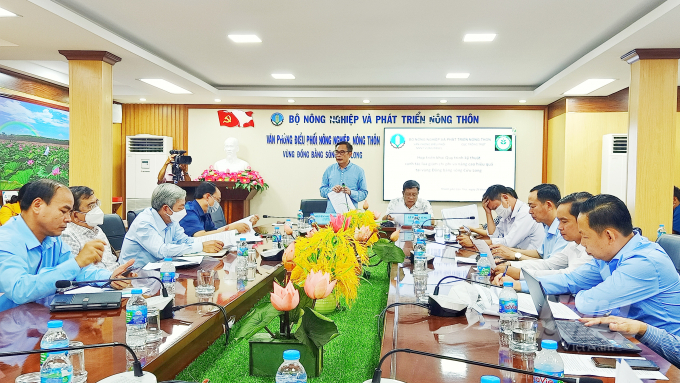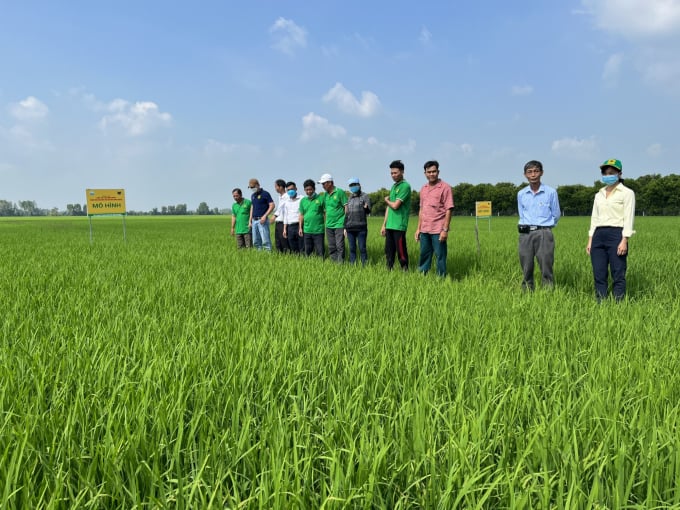November 28, 2025 | 00:32 GMT +7
November 28, 2025 | 00:32 GMT +7
Hotline: 0913.378.918
November 28, 2025 | 00:32 GMT +7
Hotline: 0913.378.918
On April 26, the Department of Crop Production and the Mekong Delta Agriculture and Rural Coordination Office (MARD) organized the implementation of a technical rice farming procedure that reduces costs and improves efficiency for leaders of Departments of Agriculture and Rural Development, Sub-Departments of Crop Production and Plant Protection in Mekong Delta regions.

Mr. Nguyen Nhu Cuong (standing), Director of the Department of Crop Production (MARD), announced the decision on the recognition of technical procedures in the field of crop production. Photo: Kim Anh.
The Department of Crop Production assessed that the technical procedure would create a new wave of production cost reduction throughout the region, showing positive results in a short amount of time, and creating momentum for better changes in society.
According to the Decision on the Recognition of Technical Procedures in the field of crop production issued by the Department of Crop Production (MARD) on April 25, 2022, the Mekong Delta cost-reducing rice farming procedure included seven specific stages applied to winter-spring and summer-autumn crops: land preparation; seed preparation; fertilizer; effective water management; pest management; harvesting and post-harvesting; geographic range of procedure application.
Depending on each season, ecological conditions, weather and group of varieties, the amount of seed sown must not exceed 80 kg/ha for the scattered sowing method (manual, seed sprayer), row sowing and 60kg/ha in the case of the cluster sowing method. A reduction in the amount of seeds will lead to a reduction in fertilizers and pesticides.

Many provinces, local units and businesses in the Mekong Delta have boldly applied advanced rice production procedures to reduce production costs. Photo: LHV.
Leaders of the local agriculture sector highly regarded the process of reducing farming costs issued by the Department of Crop Production. According to preliminary calculations of localities, this procedure could lower the cost of rice production by 15%. After the meeting, localities in the Mekong Delta would quickly spread the word and deploy to farmers, contributing to managing and improving rice production efficiency.
As stated by Mr. Nguyen Nhu Cuong, Director of the Department of Crop Production, the Mekong Delta cost-reducing rice farming procedure was basically a "soft model", flexible for every season and production conditions of the regions. In each specific location the crop production sector would continue to review, evaluate and propose adjustments accordingly.
"Rome wasn't built in a day. If you want to change people's perception, you must have a resolute implementation plan, change your mindset and production habits with rice and other crops," said Mr. Cuong.
The Department of Crop Production will continue to research and issue a number of cost reduction procedures applicable to other key crops in the near future.
Over the past time, many localities, businesses and cooperatives in the Mekong Delta have boldly applied advanced rice production and smart farming procedures along with many technical advances such as "3 decrease 3 increase", "1 must 5 decrease", integrated pest management (IPM), alternate flooding - dry irrigation techniques, and shallow - open - dry cost-saving irrigation method.
These are important prerequisites and practices for the Department of Crop Production to issue more technical rice farming procedures that can effectively reduce costs and improve production efficiency in the Mekong Delta.
Translated by Samuel Pham

(VAN) According to Mr. Vo Minh Thanh, Director of the Tay Ninh Department of Agriculture and Environment, Resolution 57 has created a new development pathway for the locality, shifting from traditional toward modern agriculture.
/2025/11/26/4909-2-154329_878.jpg)
(VAN) Pearl grouper farming in HDPE cages not only delivers economic efficiency but also contributes to protecting the environment, creating jobs, and promoting marine-based experiential tourism.

(VAN) The model of making a living under the forest canopy through the agroforestry system in Van Son commune, Bac Ninh province, is expected to generate an annual income of approximately VND 30 million/ha.

(VAN) Many enterprises in Can Tho are harnessing natural energy and reducing greenhouse gas emissions in their production processes, thereby contributing to the promotion of a sustainable green transition.
/2025/11/24/3536-2-112800_176.jpg)
(VAN) Dong Nai now has tens of thousands of hectares of forests certified for sustainable management, and this area will continue to be expanded in the coming period.

(VAN) Vinh Ha hamlet (Dai Xuyen commune, Hanoi) is shifting away from small-scale farming as households adopt bioscurity into their breeder chicken models.

(VAN) Heavy rains make aquatic species more vulnerable to disease. Proactive water management and high-tech systems help farmers prevent outbreaks and protect yields.